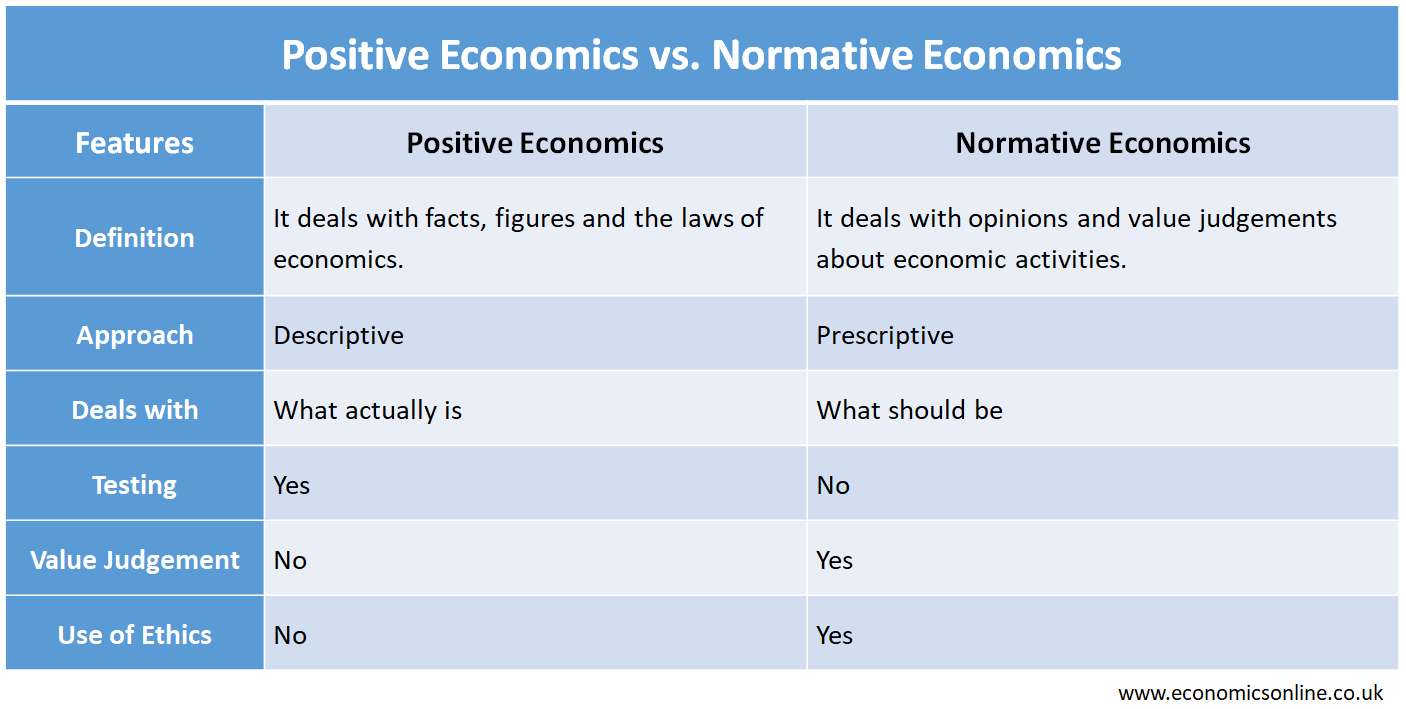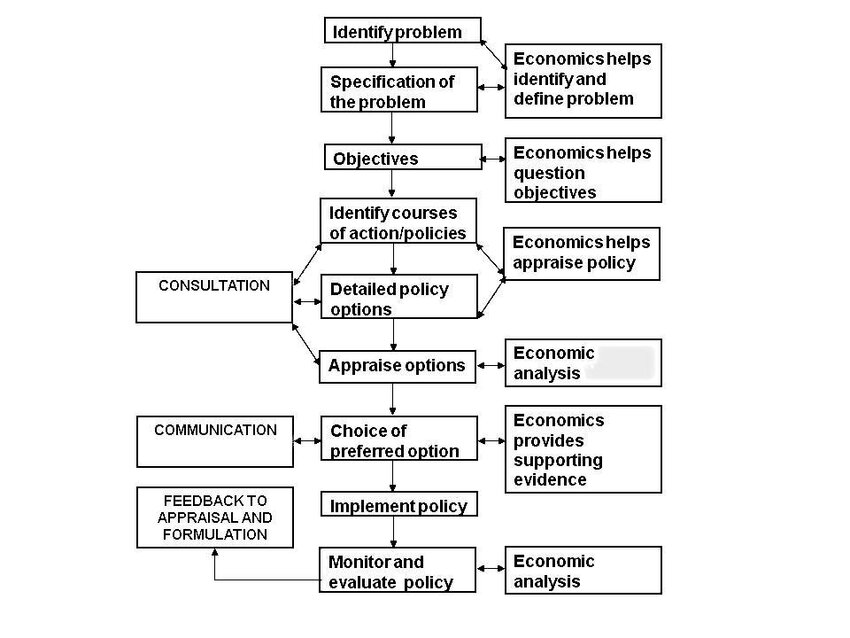AQA Specification focus:
‘How value judgements influence economic decision making and policy; people’s views concerning the best option are influenced by the positive consequences of different decisions and by moral and political judgements.’
Economics often deals with choices involving competing interests. Understanding how value judgements shape economic policy helps explain why decisions vary between individuals, governments, and institutions.
Understanding Value Judgements
Definition of Value Judgements
Value Judgement: A subjective assessment based on personal beliefs, ethics, morals, or political views, which cannot be tested or proven true or false.
Value judgements are normative in nature — they involve opinions about what ought to be rather than objective facts. Unlike positive statements, they cannot be validated solely through empirical evidence.

This diagram contrasts positive economics, which deals with objective, testable facts, with normative economics, which involves subjective value-based judgements. Source
How Value Judgements Arise
Value judgements emerge because:
Economic outcomes affect individuals differently.
People hold diverse moral, cultural, and political values.
Trade-offs involve prioritising certain groups or objectives.
They are present in nearly all major policy debates, from tax reform to climate change mitigation.
Relationship Between Value Judgements and Economic Decision Making
Economic decision making is rarely purely technical. Policymakers and analysts use data, but interpretation is shaped by their values.

This diagram outlines the steps in policy decision-making, from identifying the problem to monitoring and evaluating policy, emphasizing the role of economic analysis and value judgements at each stage. Source
Influences on decisions:
Ethical beliefs — e.g., fairness in wealth distribution.
Political ideology — e.g., free market vs. government intervention.
Social priorities — e.g., healthcare vs. defence spending.
Value judgements determine which objectives are pursued and how trade-offs are managed.
Positive Consequences and Value Judgements
While positive economics examines measurable outcomes, individuals interpret these through the lens of their values.
Example:
Positive statement: “Raising the minimum wage increases labour costs.”
Value judgement: “It is worth raising the minimum wage to improve workers’ living standards, even if it increases costs.”
The positive consequences of a decision (e.g., improved health, reduced inequality) influence perceptions of whether it is desirable.
The Role of Positive and Normative Economics
Positive Economics
Positive Economics: The branch of economics dealing with objective statements that can be tested or proven true/false using evidence.
Normative Economics
Normative Economics: The branch of economics dealing with value-based judgements and opinions about what should happen in the economy.
In policymaking:
Positive analysis provides the evidence and forecasts.
Normative judgements decide whether those outcomes are acceptable or desirable.
Value Judgements in Policy Decisions
Economic policies often require balancing conflicting aims. Value judgements influence:
The weight given to different objectives.
The choice between alternative policies.
The evaluation of success or failure.
Examples of Value Judgement in Policy
Redistribution of income: Some value equality highly, favouring progressive taxation; others prioritise incentives for productivity.
Environmental regulation: Some prioritise long-term sustainability; others prioritise immediate economic growth.
Public vs. private provision of services: Views differ based on beliefs about efficiency, fairness, and state responsibility.
Interaction Between Data and Values
Policymakers use data to forecast the likely consequences of actions, but the interpretation of those consequences depends on values.
Process:
Gather evidence (positive economics).
Predict impacts — e.g., employment changes, income shifts.
Apply value judgement — deciding which outcomes are more important.
Select policy — aligning with the decision-maker’s ethical or political stance.
Moral and Political Judgements
Moral Judgements
These relate to ideas of right and wrong. For example:
Whether society has a moral duty to provide universal healthcare.
Whether reducing inequality is inherently good.
Political Judgements
These are shaped by ideology:
Left-leaning perspectives often prioritise redistribution and social welfare.
Right-leaning perspectives often prioritise market freedom and efficiency.
Moral and political beliefs can overlap, but political positions often translate values into specific policy preferences.
Why Value Judgements Are Unavoidable
Even when evidence is clear, deciding on a policy outcome involves allocating scarce resources. The question of who benefits and who bears the cost inherently involves subjective choices.
In debates such as:
Climate change policy — balancing environmental goals with economic costs.
Healthcare spending — deciding how much should go to prevention vs. treatment.
Defence budgets — weighing security against other public services.
Different stakeholders will prioritise differently, making value judgements inevitable.
Implications for Economics Students
Students must:
Recognise the difference between positive statements (objective) and normative statements (value-based).
Understand that many economic disagreements are rooted not in data disputes but in differing value judgements.
Be able to explain how moral and political perspectives shape economic decisions.
This awareness helps in evaluating policy debates and identifying where disagreements stem from differences in evidence versus differences in values.
FAQ
Value judgements often reflect the cultural, political, and historical context of a country. Economists in nations with strong welfare traditions may value equality and redistribution more, while those in more market-oriented economies may emphasise efficiency and competition.
International differences in political systems and public expectations influence how economists prioritise policy goals and interpret data.
Yes, value judgements can evolve as societal priorities, technology, and economic conditions shift.
Factors influencing change include:
Social movements that alter moral perspectives.
Economic crises that reshape priorities, such as favouring stability over growth.
Advances in research or technology that reveal new consequences of policies.
Economic forecasts may be presented as objective, but the assumptions behind them often reflect value judgements about which variables matter most.
Recognising these ensures policymakers and the public can distinguish between factual predictions and subjective priorities. It also allows for transparent debate over whether those priorities are appropriate.
Cost–benefit analysis aims to measure net benefits objectively, but value judgements influence:
Which costs and benefits are included.
How they are weighted.
The choice of discount rates for future impacts.
Two analysts using the same data may reach different conclusions because their underlying values differ.
In emergencies such as pandemics or natural disasters, value judgements guide which objectives are prioritised first.
For example, a government may choose to prioritise public health over economic growth, or vice versa, depending on moral and political beliefs. These decisions often involve accepting certain trade-offs that reflect deeply held values.
Practice Questions
Define a value judgement in economics and explain why it cannot be tested or proven true or false. (2 marks)
1 mark for defining value judgement as a subjective statement or opinion based on personal, moral, or political beliefs.
1 mark for explaining that it cannot be tested or proven true/false because it is normative and depends on individual viewpoints.
Explain how value judgements can influence government policy decisions, using one example from the economy to support your answer. (6 marks)
1 mark for recognising that value judgements are normative statements based on opinions or beliefs.
1 mark for stating that policymakers’ decisions are influenced by moral, political, or ethical values in addition to economic evidence.
1 mark for explaining that interpretation of economic data can be shaped by these values.
1 mark for describing how conflicting objectives may be prioritised differently depending on value judgements.
1 mark for providing a relevant economic example (e.g., decision to increase minimum wage prioritising equity over efficiency).
1 mark for linking the example explicitly to the influence of value judgements on the final policy decision.

